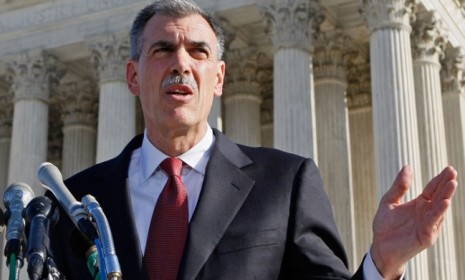The Supreme Court sours on ObamaCare: How did legal experts get it so wrong?
Supporters of President Obama's health-care reform law were confident the court would rule it constitutional. It appears the predictions were off the mark

A free daily email with the biggest news stories of the day – and the best features from TheWeek.com
You are now subscribed
Your newsletter sign-up was successful
A week ago, supporters of the Affordable Care Act and legal scholars seemed certain that the Supreme Court would find the law constitutional, by a 6-3 or even a 7-2 vote. But after three days of contentious hearings this week, such forecasts seem presumptuous: The five members of the court's conservative majority all apparently doubt whether Congress has the authority to force (nearly) every American to buy health insurance (the "individual mandate"), an essential provision of President Obama's health-care overhaul. How did so many people get their predictions so wrong? Here, four theories:
1. Obama's lawyer unexpectedly blew it
Solicitor General Donald Verrilli's defense of ObamaCare "may go down as one of the most spectacular flameouts in the history of the court," says Adam Serwer at Mother Jones. He was fighting for "liberalism's biggest domestic accomplishment since the 1960s," but came across like a stammering teenager, stumbling over the "most predictable of questions." Verrilli parroted tired talking points instead of clearly explaining how enforcing the individual mandate wouldn't give the government unlimited powers. "If the law is upheld, it will be in spite of Verrilli's performance, not because of it."
The Week
Escape your echo chamber. Get the facts behind the news, plus analysis from multiple perspectives.

Sign up for The Week's Free Newsletters
From our morning news briefing to a weekly Good News Newsletter, get the best of The Week delivered directly to your inbox.
From our morning news briefing to a weekly Good News Newsletter, get the best of The Week delivered directly to your inbox.
2. Nobody knew Scalia would embrace Tea Party talking points
ObamaCare's proponents "were badly caught off guard by the depth of the conservative bloc's apparent hostility toward the law," says Greg Sargent at The Washington Post, "and its willingness to embrace the hard right's arguments against its constitutionality." Justice Antonin Scalia, whom Obama administration officials had viewed as a potential swing vote, even invoked the "broccoli argument," asking whether, if Congress can order people to buy health insurance, it can't force them to eat broccoli, too. That "language is straight out of the Tea Party guerrilla manual that was written during the battle to prevent ObamaCare from becoming law in the first place."
3. The reform law's backers were delusional
The only surprising thing here, says John Hinderaker at Power Line, is that our nanny state might finally be "back on the path to constitutional government." The bottom line is that the Commerce Clause, which supporters say gives Congress the power to impose the insurance mandate, is way more limited in scope than fans of Obama's health-care power grab claim. Assuming the law would pass constitutional muster was pure hubris.
A free daily email with the biggest news stories of the day – and the best features from TheWeek.com
4. They were just wrong... or were they?
This wouldn't be the first time Supreme Court predictions missed the mark, says Thomas M. Keck at Britain's Guardian. Remember Bush v. Gore in 2000? Most legal scholars were certain the Supreme Court would decline to intervene, since precedents suggested that Electoral College disputes should be resolved by state authorities or Congress. Wrong! And if the court strikes down ObamaCare, it will do so again by a 5-4 conservative majority. Of course, there's another possibility: Maybe Chief Justice John Roberts or swing vote Justice Anthony Kennedy will vote to uphold ObamaCare, if only out of fear that striking it down "will be remembered for 100 years as the product of a partisan and undemocratic court."
-
 The billionaires’ wealth tax: a catastrophe for California?
The billionaires’ wealth tax: a catastrophe for California?Talking Point Peter Thiel and Larry Page preparing to change state residency
-
 Bari Weiss’ ‘60 Minutes’ scandal is about more than one report
Bari Weiss’ ‘60 Minutes’ scandal is about more than one reportIN THE SPOTLIGHT By blocking an approved segment on a controversial prison holding US deportees in El Salvador, the editor-in-chief of CBS News has become the main story
-
 Has Zohran Mamdani shown the Democrats how to win again?
Has Zohran Mamdani shown the Democrats how to win again?Today’s Big Question New York City mayoral election touted as victory for left-wing populists but moderate centrist wins elsewhere present more complex path for Democratic Party
-
 Millions turn out for anti-Trump ‘No Kings’ rallies
Millions turn out for anti-Trump ‘No Kings’ ralliesSpeed Read An estimated 7 million people participated, 2 million more than at the first ‘No Kings’ protest in June
-
 Ghislaine Maxwell: angling for a Trump pardon
Ghislaine Maxwell: angling for a Trump pardonTalking Point Convicted sex trafficker's testimony could shed new light on president's links to Jeffrey Epstein
-
 The last words and final moments of 40 presidents
The last words and final moments of 40 presidentsThe Explainer Some are eloquent quotes worthy of the holders of the highest office in the nation, and others... aren't
-
 The JFK files: the truth at last?
The JFK files: the truth at last?In The Spotlight More than 64,000 previously classified documents relating the 1963 assassination of John F. Kennedy have been released by the Trump administration
-
 'Seriously, not literally': how should the world take Donald Trump?
'Seriously, not literally': how should the world take Donald Trump?Today's big question White House rhetoric and reality look likely to become increasingly blurred


